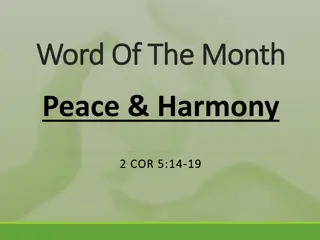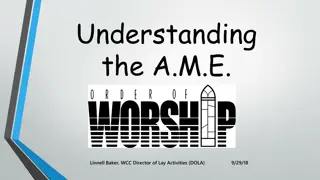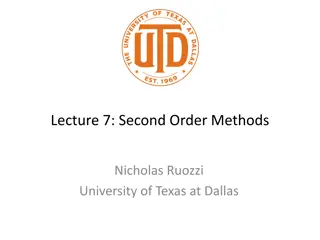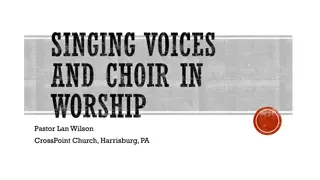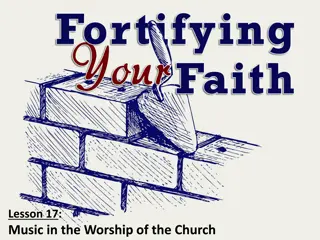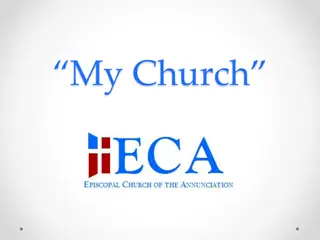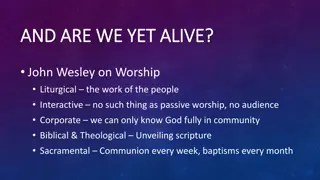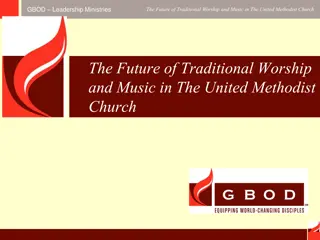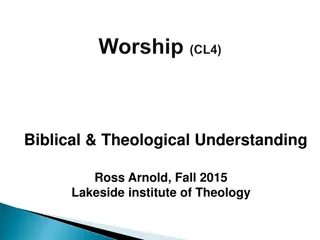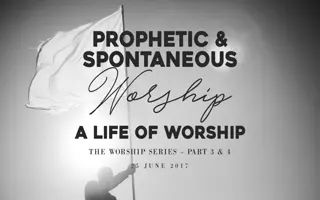Principles of Order in Public Worship: Participation and Harmony
In public worship, active participation and orderly conduct are essential for the edification of the church. This study delves into the principles outlined in 1 Corinthians 14:26-40, emphasizing the importance of willing engagement and structured harmony in gatherings. Explore the dynamics between speaking in tongues and prophecy, highlighting the need for thoughtful participation and intentional order for effective worship services.
Download Presentation

Please find below an Image/Link to download the presentation.
The content on the website is provided AS IS for your information and personal use only. It may not be sold, licensed, or shared on other websites without obtaining consent from the author.If you encounter any issues during the download, it is possible that the publisher has removed the file from their server.
You are allowed to download the files provided on this website for personal or commercial use, subject to the condition that they are used lawfully. All files are the property of their respective owners.
The content on the website is provided AS IS for your information and personal use only. It may not be sold, licensed, or shared on other websites without obtaining consent from the author.
E N D
Presentation Transcript
Order and Authority in Public Worship Studies in 1 Corinthians Series [34] 1 Corinthians 14:26-40 March 29, 2015 Pastor Paul K. Kim
RECAP: TONGUES & PROPHECY IN LIGHT OF EDIFICATION IN PUBLIC WORSHIP Speaking in tongues is a gift of the Holy Sprit to pray in utterance not understood by the speaker (cf. Acts 2 & 1 Cor. 14). Prophecy is a gift of the Holy Sprit to speak a word of message or report prompted spontaneously by the Spirit for the purpose of edification, encouragement, and consolation of the church. 5 Reasons to prophesy (over tongues) in services/gatherings. #1. Audience: Tongues are to God but prophecy is to people. #2. Beneficiaries: Tongues benefit oneself; prophecy is for others. #3. Intelligibility: Tongues are not intelligible but prophecy is. #4. Edification: It s better to speak five understandable words to edify others than ten thousand words in a tongue. #5. Mature Thinking: It is shrewd to seek to prophesy in gatherings.
WHAT PRINCIPLES SHOULD WE FOLLOW IN PUBLIC WORSHIP/GATHERINGS? 1) In public worship/gatherings, we are to be WILLING PARTICIPANTS (not mere spectators) in edifying the church. 26What then, brothers? When you come together, each one has a hymn, a lesson, a revelation,a tongue, or an interpretation. Let all things be done for building up. (v. 26) In the first century, church gatherings and worship services were more spontaneous and participatory than now. Although the external change may be necessary, a key timeless principle is participation as the one body of Christ. How are we to participate in building up? It s not necessarily through on-stage participation but through willing readiness.
WHAT PRINCIPLES SHOULD WE FOLLOW IN PUBLIC WORSHIP/GATHERINGS? 2) In public worship/gatherings, we are to do all things in ORDER AND HARMONY for the edification of the church. 27If any speak in a tongue, let there be only two or at most three, and each in turn, and let someone interpret. 28But if there is no one to interpret, let each of them keep silent in church and speak to himself and to God. (vs. 27-28)
WHAT PRINCIPLES SHOULD WE FOLLOW IN PUBLIC WORSHIP/GATHERINGS? 2) In public worship/gatherings, we are to do all things in ORDER AND HARMONY for the edification of the church. 29Let two or three prophets speak, and let the others weigh what is said.30If a revelation is made to another sitting there, let the first be silent.31For you can all prophesy one by one, so that all may learn and all be encouraged,32and the spirits of prophets are subject to prophets.33For God is not a God of confusion but of peace. (vs. 29-33a) Encouragement for rich participation does NOT mean that it s okay to have chaos and confusion in worship/gatherings . Tongues speakers are to be limited to 2-3 with interpretation in turns; the same applies to prophecy, weighing what s said. This orderliness does NOT mean stoic/somber orderliness but orderly spontaneity or spontaneous orderliness.
Seven Criteria for Weighing a Prophecy 1. Does it glorify God rather than the speaker, church, or denomination? Does it accord with Scripture? Does it build up the church? Is it spoken in love? Does the speaker submit himself or herself to the judgment and consensus of others in spiritual humility? Is the speaker in control of himself or herself? Is there a reasonable amount of instruction, or does the message seem excessive in detail? 2. 3. 4. 5. 6. 7. Michael Green
WHAT PRINCIPLES SHOULD WE FOLLOW IN PUBLIC WORSHIP/GATHERINGS? 3) In public worship/gatherings, we are to give deference to spiritual leadership of MALE HEADSHIP in the church. As in all the churches of the saints,34the women should keep silent in the churches. For they are not permitted to speak, but should be in submission, as the Law also says.35If there is anything they desire to learn, let them ask their husbands at home. For it is shameful for a woman to speak in church. (vs. 33b-35) In light of a lager context (this letter and the NT), this does NOT mean absolute silence nor inferior value of women.
4Every man who prays or prophesies with his head covered dishonors his head, 5but every wife who prays or prophesies with her head uncovered dishonors her head, since it is the same as if her head were shaven. 1 Corinthians 11:4-5 17 And in the last days it shall be, God declares, that I will pour out my Spirit on all flesh, and your sons and your daughters shall prophesy, and your young men shall see visions, and your old men shall dream dreams... Acts 2:17 8On the next day we departed and came to Caesarea, and we entered the house of Philip the evangelist, who was one of the seven, and stayed with him.9He had four unmarried daughters, who prophesied. Acts 21:8-9
WHAT PRINCIPLES SHOULD WE FOLLOW IN PUBLIC WORSHIP/GATHERINGS? 3) In public worship/gatherings, we are to give deference to spiritual leadership of MALE HEADSHIP in the church. As in all the churches of the saints,34the women should keep silent in the churches. For they are not permitted to speak, but should be in submission, as the Law also says.35If there is anything they desire to learn, let them ask their husbands at home. For it is shameful for a woman to speak in church. (vs. 33b-35) In light of a lager context (this letter and the NT), this does NOT mean absolute silence nor inferior value of women. In understanding this passage, we must avoid (1) disregarding specific context and (2) disregarding it as totally irrelevant. The best may be in the mixture of two: (1) timeless male headship and (2) circumstantial issues they are not to speak in judging prophecies (= practicing authority on the church).
WHAT PRINCIPLES SHOULD WE FOLLOW IN PUBLIC WORSHIP/GATHERINGS? 4) In public worship/gatherings, we are to submit to SCRIPTURAL GUIDANCE AND AUTHORITY for the edification of the church. 36Or was it from you that the word of God came? Or are you the only ones it has reached?37If anyone thinks that he is a prophet, or spiritual, he should acknowledge that the things I am writing to you are a command of the Lord. 38If anyone does not recognize this, he is not recognized. (vs. 36-38)
WHAT PRINCIPLES SHOULD WE FOLLOW IN PUBLIC WORSHIP/GATHERINGS? 4) In public worship/gatherings, we are to submit to SCRIPTURAL GUIDANCE AND AUTHORITY for the edification of the church. 39So, my brothers, earnestly desire to prophesy, and do not forbid speaking in tongues. 40But all things should be done decently and in order. (vs. 39-40) In concluding his instructions, Paul gives (1) a warning for the spiritually arrogant Corinthians and (2) a succinct summary. The warning is against their pride in their spirituality they are to recognize Paul s apostolic authority and be teachable. The summary is to strongly encourage believers to prophesy while not forbidding speaking in tongues in public worship.
THREE PRACTICAL QUESTIONS FOR OUR EVERYDAY LIFE 1. In what ways are you more convinced of your need to be a willing participant (not a mere spectator) in public worship/gatherings? What will you do about it? 2. What would it mean for you to seek order & harmony in our church gatherings i.e., Sunday worship, homegroup gatherings, men/women s group meetings, etc.? 3. What would it mean for you to submit to the authority and guidance of Scripture in edifying the church?




